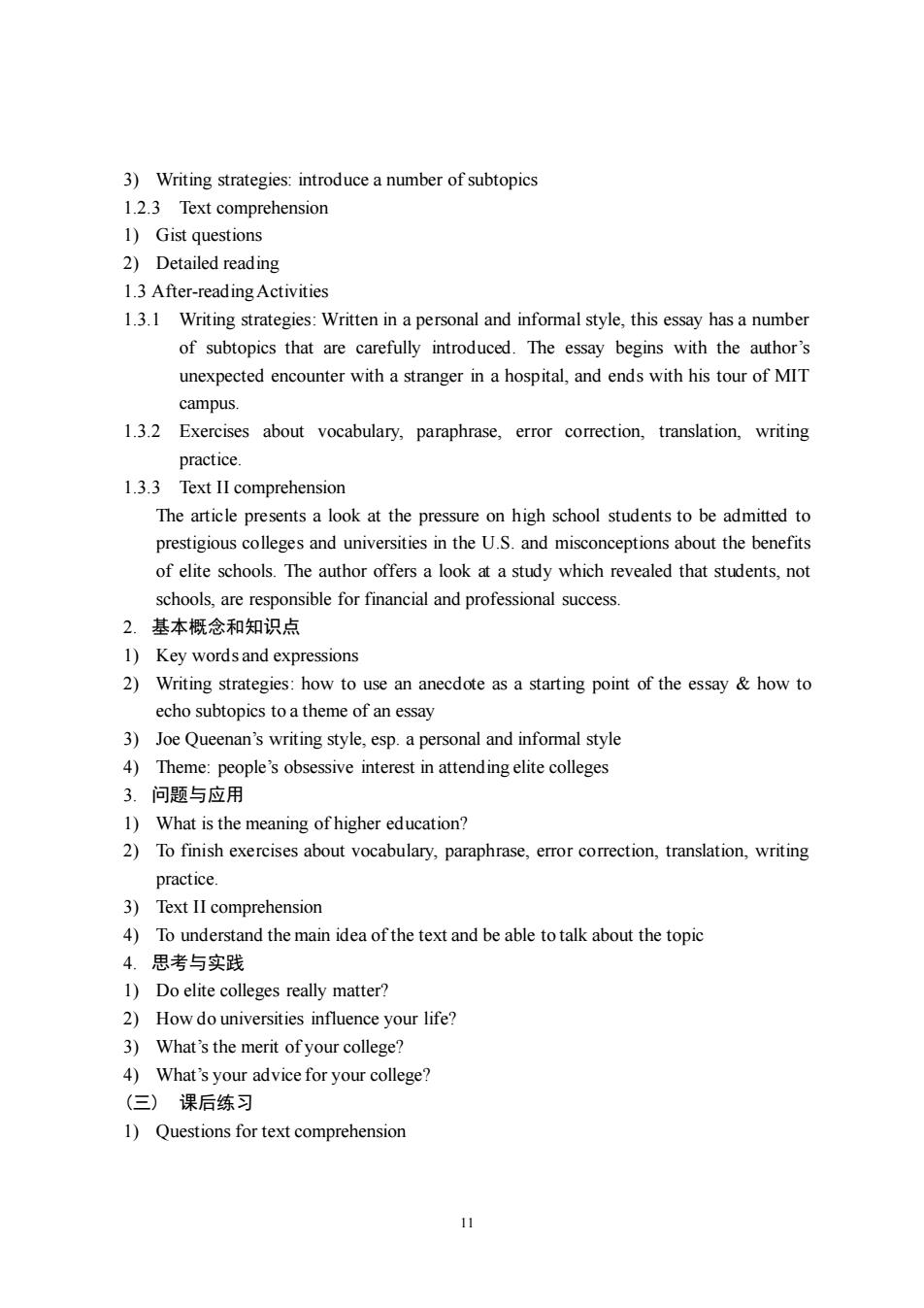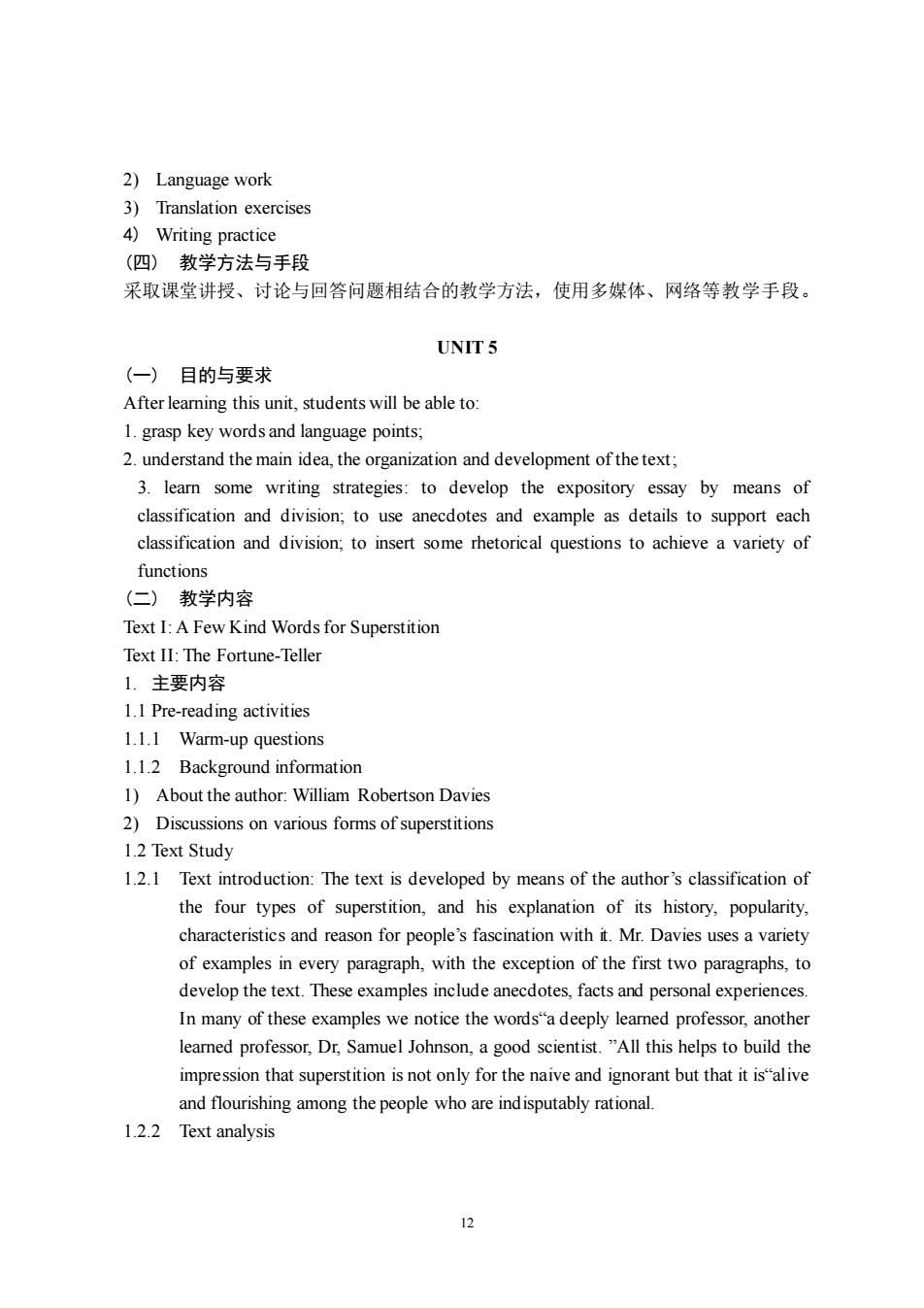
3)Writing strategies:introduce a number of subtopics 1.2.3 Text comprehension 1)Gist questions 2)Detailed reading 1.3 After-reading Activities 1.3.1 Writing strategies:Written in a personal and informal style,this essay has a number of subtopics that are carefully introduced.The essay begins with the author's unexpected encounter with a stranger in a hospital,and ends with his tour of MIT campus. 1.3.2 Exercises about vocabulary,paraphrase,error correction,translation,writing practice. 1.3.3 Text II comprehension The article presents a look at the pressure on high school students to be admitted to prestigious colleges and universities in the U.S.and misconceptions about the benefits of elite schools.The author offers a look at a study which revealed that students,not schools,are responsible for financial and professional success. 2.基本概念和知识点 1)Key words and expressions 2)Writing strategies:how to use an anecdote as a starting point of the essay&how to echo subtopics to a theme of an essay 3)Joe Queenan's writing style,esp.a personal and informal style 4)Theme:people's obsessive interest in attending elite colleges 3.问题与应用 1)What is the meaning of higher education? 2)To finish exercises about vocabulary,paraphrase,error correction,translation,writing practice 3)Text II comprehension 4)To understand the main idea of the text and be able to talk about the topic 4.思考与实践 1)Do elite colleges really matter? 2)How do universities influence your life? 3)What's the merit of your college? 4)What's your advice for your college? (三)课后练习 1)Questions for text comprehension 11
11 3) Writing strategies: introduce a number of subtopics 1.2.3 Text comprehension 1) Gist questions 2) Detailed reading 1.3 After-reading Activities 1.3.1 Writing strategies: Written in a personal and informal style, this essay has a number of subtopics that are carefully introduced. The essay begins with the author’s unexpected encounter with a stranger in a hospital, and ends with his tour of MIT campus. 1.3.2 Exercises about vocabulary, paraphrase, error correction, translation, writing practice. 1.3.3 Text II comprehension The article presents a look at the pressure on high school students to be admitted to prestigious colleges and universities in the U.S. and misconceptions about the benefits of elite schools. The author offers a look at a study which revealed that students, not schools, are responsible for financial and professional success. 2. 基本概念和知识点 1) Key words and expressions 2) Writing strategies: how to use an anecdote as a starting point of the essay & how to echo subtopics to a theme of an essay 3) Joe Queenan’s writing style, esp. a personal and informal style 4) Theme: people’s obsessive interest in attending elite colleges 3. 问题与应用 1) What is the meaning of higher education? 2) To finish exercises about vocabulary, paraphrase, error correction, translation, writing practice. 3) Text II comprehension 4) To understand the main idea of the text and be able to talk about the topic 4. 思考与实践 1) Do elite colleges really matter? 2) How do universities influence your life? 3) What’s the merit of your college? 4) What’s your advice for your college? (三) 课后练习 1) Questions for text comprehension

2)Language work 3)Translation exercises 4)Writing practice (四) 教学方法与手段 采取课堂讲授、讨论与回答问题相结合的教学方法,使用多媒体、网络等教学手段。 UNIT5 (一)目的与要求 After learning this unit,students will be able to: 1.grasp key words and language points; 2.understand the main idea,the organization and development ofthetext: 3.learn some writing strategies:to develop the expository essay by means of classification and division;to use anecdotes and example as details to support each classification and division;to insert some rhetorical questions to achieve a variety of functions (二)教学内容 Text I:A Few Kind Words for Superstition Text II:The Fortune-Teller 1.主要内容 1.1 Pre-reading activities 1.1.1 Warm-up questions 1.1.2 Background information 1)About the author:William Robertson Davies 2)Discussions on various forms of superstitions 1.2 Text Study 1.2.1 Text introduction:The text is developed by means of the author's classification of the four types of superstition,and his explanation of its history,popularity, characteristics and reason for people's fascination with it.Mr.Davies uses a variety of examples in every paragraph,with the exception of the first two paragraphs,to develop the text.These examples include anecdotes,facts and personal experiences. In many of these examples we notice the words"a deeply learned professor,another leamed professor,Dr.Samuel Johnson,a good scientist."All this helps to build the impression that superstition is not only for the naive and ignorant but that it is"alive and flourishing among the people who are indisputably rational. 1.2.2 Text analysis
12 2) Language work 3) Translation exercises 4) Writing practice (四) 教学方法与手段 采取课堂讲授、讨论与回答问题相结合的教学方法,使用多媒体、网络等教学手段。 UNIT 5 (一) 目的与要求 After learning this unit, students will be able to: 1. grasp key words and language points; 2. understand the main idea, the organization and development of the text; 3. learn some writing strategies: to develop the expository essay by means of classification and division; to use anecdotes and example as details to support each classification and division; to insert some rhetorical questions to achieve a variety of functions (二) 教学内容 Text I: A Few Kind Words for Superstition Text II: The Fortune-Teller 1. 主要内容 1.1 Pre-reading activities 1.1.1 Warm-up questions 1.1.2 Background information 1) About the author: William Robertson Davies 2) Discussions on various forms of superstitions 1.2 Text Study 1.2.1 Text introduction: The text is developed by means of the author’s classification of the four types of superstition, and his explanation of its history, popularity, characteristics and reason for people’s fascination with it. Mr. Davies uses a variety of examples in every paragraph, with the exception of the first two paragraphs, to develop the text. These examples include anecdotes, facts and personal experiences. In many of these examples we notice the words“a deeply learned professor, another learned professor, Dr, Samuel Johnson, a good scientist. ”All this helps to build the impression that superstition is not only for the naive and ignorant but that it is“alive and flourishing among the people who are indisputably rational. 1.2.2 Text analysis